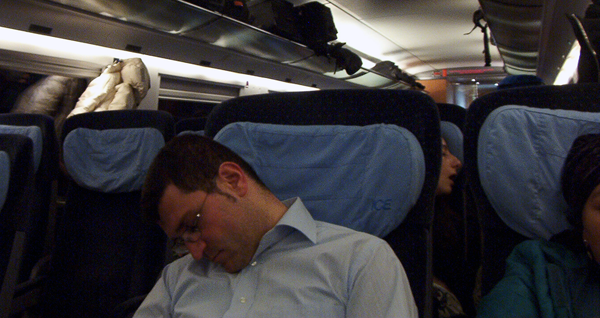Submitted on
 One of the ideas popping out during Tuesday’s Thrive Summit in Boston was that sleep is important.
One of the ideas popping out during Tuesday’s Thrive Summit in Boston was that sleep is important.
Duh.
OK, I dumbed that down a little for effect, but two speakers chose to use sleep to illustrate wellness, which I do think is indicative of its growing focus.
CEO Chris Boyce, speaking in the morning, came back to it a couple of times, not only because of sleep’s importance to the business, but because he’s awakened to its importance in his own life. He said before last year, he was getting 4-5 hours a night, thinking he was “one of the guys who didn’t need” more. In the past year, he’s raised his average to 7 and found it to be transformative.
Duh.
However! How much focus do you, or the people you know, put into getting enough sleep. When someone is under-rested, they are more likely to make poor food choices, if, say, donuts are in the break room. The willingness to follow one’s intentions is softened when you’re tired. Same with exercise: If you stayed up too late, you might decide to skip your regular gym visit the next day.
Being rested matters much more than the attention most people pay to it. “We have a bad culture of sleep. Lack of sleep is a badge of honor. The challenge of sleep is, if you have less than 6 hours of sleep four days in a row, it’s the equivalent of coming to work drunk,” Boyce said.
Dr. Dexter Shurney, chief medical director for Cummins, who spoke in the afternoon, was talking about intrinsic motivation. “Sleep is my favorite. If you can tell someone how to get a better quality of sleep, they start feeling better the very next day. They say, ‘you don’t even have to pay me those incentive dollars. You couldn’t pay me to go back to the way I was doing things.”
One question this raises for me is, how can an employer, committed to wellness for all the best reasons, affect employee sleep habits? I can’t imagine a boss calling me in and telling me I’d better get more sleep. Of course, performance is always the basis for such conversations, and if someone is falling asleep at their desk, that’s not good performance.
If the issue is, say, exercise, employers can offer gym subsidies (or whatever). If it’s nutrition, they can charge more in the vending machines for unhealthy food than healthy food (or whatever). But for sleep, are you going to have cots, and — akin to La Porte (Ind.) Hospital’s “Wellness on the Clock initiative — insist that workers take a nap? That’s hard to imagine.
While I try to work that out, take advantage of the point. Sleep, which for so many of us is just something we fit in around life, deserves more attention by each of us, for nothing more than base self-interest.
Disclosure: I am Virgin Pulse's guest at this event, which includes lunch and beverages. I was not required even to share what I'm writing with anyone, never mind gain approval.
- Michael's blog
- Log in to post comments